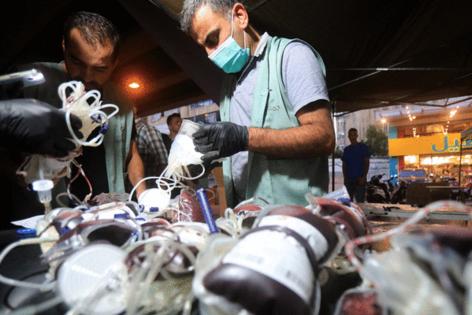Commentary: Israel's growing war with Hezbollah is traumatizing Lebanon. There's only one path to peace
Published in Op Eds
Israel’s remote detonation of thousands of Hezbollah pagers and walkie-talkies has set off a series of escalations leading to the deadliest day of Israeli airstrikes against Lebanon in nearly two decades.
But while many Western politicians, analysts and media outlets were fixated on the novelty of an attack that seemed to be pulled from the pages of a spy thriller — expressing amazement at Israeli intelligence’s success in planting the explosive devices among militia members — they largely ignored the sheer terror thousands of Lebanese civilians experienced during the explosions that shook crowded neighborhoods over two days last week. Lebanon is a country that has suffered through decades of war and trauma, including an ongoing economic collapse and the 2020 Beirut port explosion.
The booby-trapped pagers and handheld radios, which had apparently been rigged with explosives before being shipped to Lebanon, killed at least 37 people and injured more than 3,000. The blasts were followed by a dramatic escalation on Thursday, when Israeli forces carried out the most intense airstrikes on southern Lebanon in nearly a year. The next day, an Israeli airstrike leveled two buildings in southern Beirut, killing at least 45 — including three children — and injuring dozens. The attack killed two senior Hezbollah commanders and 12 other militia members who were apparently meeting underneath one of the buildings.
On Saturday, Hezbollah responded by firing dozens of rockets into northern Israel, and Israel carried out nearly 300 airstrikes in southern Lebanon said to be targeting Hezbollah rocket launchers. The group fired more than 100 rockets into Israel early Sunday, striking deeper into Israeli territory than it had since October. And on Monday, Israel escalated yet again with airstrikes that killed more than 350 and injured more than 1,200, according to Lebanese officials, the heaviest toll inflicted by Israeli forces there since 2006.
Each attack and counterattack increases the risk that Israel’s war on Gaza could devolve into a wider conflict that engulfs Lebanon and other countries in the Middle East. A full-scale war between Israel and Hezbollah would dwarf their conflict in the summer of 2006. It could precipitate regional hostilities pitting Israel and the United States on one side against Iran and its network of allied militias in Lebanon, Iraq, Syria and Yemen on the other.
Since Hamas militants attacked Israel on Oct. 7, President Joe Biden and his top aides have insisted that their goal is to prevent Israel’s subsequent invasion of Gaza from growing into such a regional conflagration. Hezbollah began firing rockets and drones into northern Israel on Oct. 8 in what the group’s leaders described as an act of solidarity with Palestinians intended to divert Israeli resources from Gaza.
But Biden has repeatedly failed to follow through on the most likely path to preventing a regional war: pressing for an immediate cease-fire in Gaza, particularly by using U.S. leverage to withhold billions of dollars in weapons shipments to Israel. All of Iran’s allies, especially Hezbollah, have indicated that they would stop their attacks on Israel once the fighting in Gaza ends.
Over the past 11 months, Hezbollah and Israeli forces exchanged fire almost daily across the Israel-Lebanon border, but until Israel’s attacks last week, Hezbollah had avoided the kind of large-scale response that would precipitate an all-out war. Israel’s retaliatory airstrikes, artillery shelling and targeted assassinations, meanwhile, killed hundreds of the group’s fighters. More than 100,000 civilians have been forced out of their homes on both sides of the border.
Israel’s exploding pagers and handheld radios escalated the conflict with a particularly insidious and reckless attack that likely constituted a war crime. As Human Rights Watch and other groups noted, international humanitarian law forbids the use of booby traps, especially with objects that are commonly used by civilians.
The attack detonated thousands of bombs across a country roughly the size of Connecticut — in grocery stores, hospitals, sidewalk cafes and barber shops and at funerals. Children, medical workers and innocent bystanders were killed and maimed. In a statement after the first wave of explosions, Hezbollah noted that it had issued pagers “to employees of various units and institutions,” hinting that the devices were distributed not only to its fighters but also to civilian workers. The group is not only Lebanon’s most dominant military force but also its most powerful political party, and it runs an extensive social-service network including schools, hospitals, supermarkets and credit unions.
Over those two days, I made a round of phone calls to check on family and friends across Beirut, southern Lebanon and Dahiyeh, a densely populated, Shiite-dominated suburb of Beirut. During many of these calls, I could hear ambulance sirens wailing in the background. Hospitals were overwhelmed by an influx of thousands of trauma victims, many with life-changing injuries to eyes and limbs. One ophthalmologist told the BBC that in 25 years of practice, he had “never removed as many eyes” as he was forced to in one day last week.
Those who were not injured were left in shock and overwhelming paranoia about the most basic aspects of daily life. One of my cousins who lives in Dahiyeh had disconnected the solar-powered lithium batteries that provided electricity to his apartment for fear that they could detonate. He and his family were sitting in the dark. “What can we do?” my cousin asked. “We don’t know what to believe anymore.”
The road to de-escalation and calm in the region must begin with a cease-fire in Gaza. As long as the Biden administration refuses to acknowledge and act on that reality, Lebanon and the Middle East will be overwhelmed by more bloodshed, fear and chaos.
_____
Mohamad Bazzi is the director of the Hagop Kevorkian Center for Near Eastern Studies and a journalism professor at New York University.
_____
©2024 Los Angeles Times. Visit at latimes.com. Distributed by Tribune Content Agency, LLC.




























































Comments